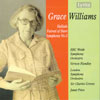Grace Williams Ballads for Orchestra; Symphony No 2
View record and artist detailsRecord and Artist Details
Composer or Director: Grace (Mary) Williams
Genre:
Orchestral
Label: Lyrita
Magazine Review Date: 12/1996
Media Format: CD or Download
Media Runtime: 69
Mastering:
Stereo
ADD
Catalogue Number: SRCD327

Tracks:
| Composition | Artist Credit |
|---|---|
| Ballads for Orchestra |
Grace (Mary) Williams, Composer
BBC Welsh Symphony Orchestra Grace (Mary) Williams, Composer Vernon Handley, Conductor |
| Fairest of Stars |
Grace (Mary) Williams, Composer
Charles Groves, Conductor Grace (Mary) Williams, Composer Janet Price, Soprano London Symphony Orchestra |
| Symphony No. 2 |
Grace (Mary) Williams, Composer
BBC Welsh Symphony Orchestra Grace (Mary) Williams, Composer Vernon Handley, Conductor |
Author: Arnold Whittall
This is Lyrita’s second CD of Grace Williams reissues. My review of the first (6/95) revealed that I had forgotten that the Second Symphony had been recorded back in 1979. Now it is reissued here, an absorbing work whose mix of styles and models serves as a reminder that pluralism in music is not just a phenomenon of the years since 1980. The symphony begins by evoking Shostakovich and Vaughan Williams but, by the finale, it is a late-romanticism recalling both Wagner and Mahler that provides the source for Williams’s most powerful utterances, before the final ‘return to earth’ – and to echoes of Vaughan Williams.
Something of the symphony’s stylistic blend, with its inherent and persistent tensions, can also be heard in Ballads. This is music with a strong narrative drive, full of incident and sturdily constructed, but Ballads and the symphony are quite heavily scored, and these performances, though excellent in many ways, now sound rather congested. A wider sonic canvas is needed, to let more light and air into the textures.
These orchestral compositions reveal a distinctive personality, but Williams is still more impressive in the neo-Straussian opulence of Fairest of Stars, a setting of Milton whose vocal line seems to reflect the wonder and ecstasy of Ariadne auf Naxos. At the same time, the composer’s familiarity with Britten’s music is also recalled in certain turns of phrase. Fairest of Stars has a symphonic expansiveness, yet the rich instrumental commentary never impedes the vocal part, here projected with admirable sensitivity by Janet Price.'
Something of the symphony’s stylistic blend, with its inherent and persistent tensions, can also be heard in Ballads. This is music with a strong narrative drive, full of incident and sturdily constructed, but Ballads and the symphony are quite heavily scored, and these performances, though excellent in many ways, now sound rather congested. A wider sonic canvas is needed, to let more light and air into the textures.
These orchestral compositions reveal a distinctive personality, but Williams is still more impressive in the neo-Straussian opulence of Fairest of Stars, a setting of Milton whose vocal line seems to reflect the wonder and ecstasy of Ariadne auf Naxos. At the same time, the composer’s familiarity with Britten’s music is also recalled in certain turns of phrase. Fairest of Stars has a symphonic expansiveness, yet the rich instrumental commentary never impedes the vocal part, here projected with admirable sensitivity by Janet Price.'
Discover the world's largest classical music catalogue with Presto Music.

Gramophone Digital Club
- Digital Edition
- Digital Archive
- Reviews Database
- Full website access
From £8.75 / month
Subscribe
Gramophone Full Club
- Print Edition
- Digital Edition
- Digital Archive
- Reviews Database
- Full website access
From £11.00 / month
Subscribe
If you are a library, university or other organisation that would be interested in an institutional subscription to Gramophone please click here for further information.




